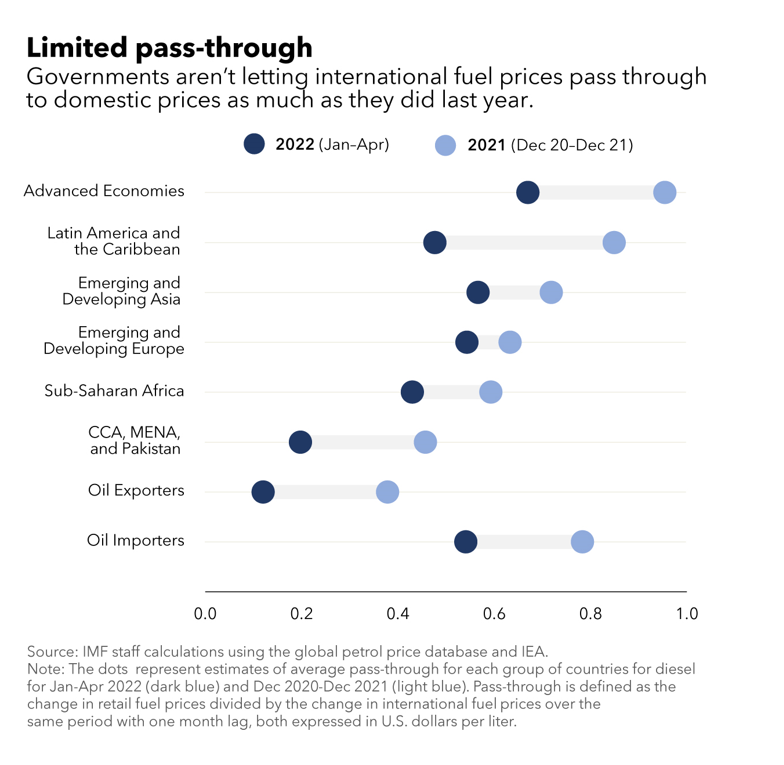Response to high food, energy prices should focus on the most vulnerable
Governments confront difficult policy choices as they try to shield their people from record food prices and soaring energy costs driven higher by the war in Ukraine.
Countries introduced a variety of policy measures in response to this unprecedented surge in prices of the most crucial commodities. Our survey of these announced measures by member nations shows that many governments tried to limit the rise in domestic prices as international prices increased, either by cutting taxes or providing direct price subsidies. But such support measures in turn create new pressures on budgets already strained by the pandemic.
Limiting the price pass-through is not always the best approach. According to a new IMF note, policymakers should allow high global prices to pass through to the domestic economy while protecting vulnerable households affected by the increases. That’s ultimately less costly than keeping prices artificially low for all irrespective of their ability to pay.
Not all countries are able to follow the same path. Where subsidies exist, the pacing of price adjustments and the extent to which social safety nets are used will differ from country to country. That’s why our note offers nuanced policy advice for countries depending on individual country circumstances, such as the strength of the social safety net, the level of existing food and fuel subsidies, and the availability of fiscal space.
Soaring prices
Russia’s invasion of Ukraine followed last year’s steep gains in commodity markets, pushing food prices to a record and natural gas to historic highs. Prices for wheat, a staple in which Russia and Ukraine together account for about a quarter of global exports, are up 54 percent from a year earlier. With food and energy imports from these sources disrupted, countries face high costs and uncertainty about supplies.
People in low-income countries are most vulnerable to higher prices because food accounts for 44 percent of consumption on average, compared with 28 percent in emerging market economies and 16 percent in advanced economies. Oil prices have also seen steep gains, which impose different burdens on consumers.
Higher-income households tend to use more fuel than lower-income households, and they are bigger users of gasoline compared with poorer households, which in many developing countries tend to consume more kerosene. Government policies to mitigate the social impact of rising prices must take these differences into account and ensure that the burden is not disproportionately felt by the poor.
Policy responses
The pass-through of international fuel prices to domestic consumers has been lower in the first four months of this year than last year. Moreover, the pass-through has been highest in advanced economies and lowest in oil-exporting emerging and developing countries.
Fuel subsidies prevalent in many oil-exporting countries in the Middle East, North Africa, and sub-Saharan Africa are a big part of the reason why consumers in those regions may be feeling less pain at the pump, albeit at the expense of mounting fiscal costs and thus, in many cases, future cuts in other public services.

More than half of the 134 countries we surveyed had announced at least one measure in response to higher energy and food prices. Emerging and developing economies announced fewer new policy measures, likely because they continue to rely on existing energy and food subsidies and limiting—or avoiding—adjustments in domestic prices.
They might also have less fiscal room to react or more difficulty in quickly scaling up their social safety nets. In advanced economies, cash and semi-cash transfers (including vouchers and utility bill discounts) were announced by the greatest number of countries. In emerging and developing economies, reductions in consumption taxes were the most frequently announced measures.
Social safety-net considerations
Although most countries are limiting international price pass-throughs, this is not advisable. Price signals are crucial to letting demand and supply adjust and inducing a demand response, in which high prices encourage people to be more energy efficient.
On the other hand, subsidized prices encourage more consumption, putting further pressures on energy prices. At the same time, countries should provide temporary and targeted transfers to most vulnerable households.
A demand response can be sizable for energy, but much less so for food because people need to eat about the same amount. Still, countries should refrain from preventing domestic prices from adjusting because such measures, which result in subsidies, are not efficient in protecting the most vulnerable.
They also are costly, crowd out more productive spending, and reduce producer and distributor incentives. We advise allowing price pass-through on food, provided that the vulnerable are protected and food security is not at risk.
We also stress that countries should consider the strength of social safety nets when setting policies:
- Countries with strong social safety nets could use targeted, temporary cash transfers to lessen the impact on vulnerable people. These countries can provide targeted transfers relying on existing social programs.
- Countries where safety nets are not strong enough to support the most vulnerable can expand their most efficient existing programs by increasing benefit levels and coverage as needed. Digital tools can be used, for instance, to register beneficiaries and deliver benefits.
- Countries with existing energy or food subsidies should gradually pass international prices through to consumers while committing to eliminating subsidies in coming years. The pace of pass-through should be carefully calibrated based on the gap between retail and international prices, the available fiscal space, and the ability to implement measures to protect the vulnerable.
In countries where food security is a concern and all other options have been exhausted, governments can consider other temporary steps, such as price subsidies or import taxes with clear sunset clauses for basic food staples.
Governments should also try to increase food supply by supporting production, avoiding stockpiling, and using food reserves when available. Where food security is at risk, direct distribution of staple foods may be necessary.
Over the next two to three years, governments should focus on investing in social safety nets and reforming existing subsidies. Such overhauls will help countries improve resilience and promote more productive spending to support inclusive growth.








